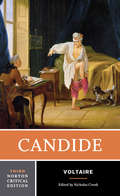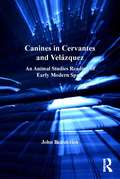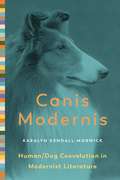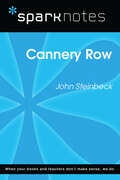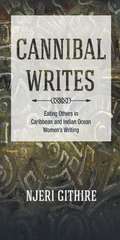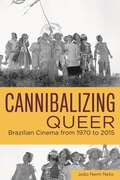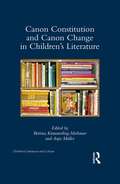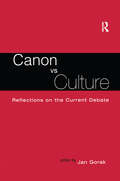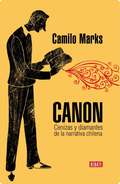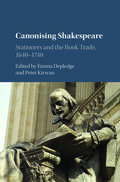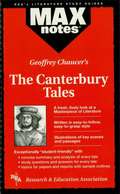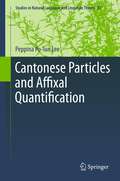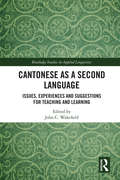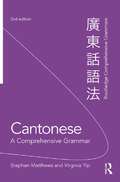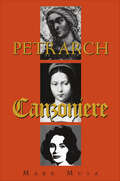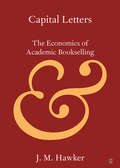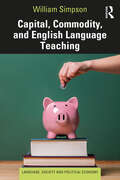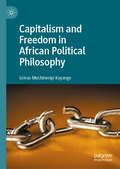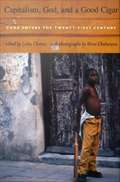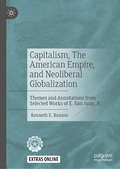- Table View
- List View
Candide (Third Edition) (Norton Critical Editions)
by Voltaire Nicholas CronkCandide has been delighting readers since 1759 with its satiric wit, provocations, and warnings. The novella has never been out of print and has been translated into every conceivable language. The text of this Norton Critical Edition remains that of Robert M. Adams’s superlative translation, accompanied by explanatory annotations. The Norton Critical Edition also includes: · A full introduction by Nicholas Cronk. · Six background studies of Enlightenment ideas and themes (by Richard Holmes, Adam Gopnik, W. H. Barber, Dennis Fletcher, Haydn Mason, and Nicholas Cronk), five of these new to the Third Edition. · Seven critical essays—five of them new to this edition—representing a wide range of approaches to Candide. Contributors include J. G. Weightman, Robin Howells, James J. Lynch, Philip Stewart, Erich Auerbach, and Jean Starobinski. · A revised and expanded Selected Bibliography.
Canines in Cervantes and Velázquez: An Animal Studies Reading of Early Modern Spain (New Hispanisms: Cultural and Literary Studies)
by John BeusterienThe study of the creation of canine breeds in early modern Europe, especially Spain, illustrates the different constructs against which notions of human identity were forged. This book is the first comprehensive history of early modern Spanish dogs and it evaluates how two of Spain’s most celebrated and canonical cultural figures of this period, the artist Diego Velázquez and the author Miguel de Cervantes, radically question humankind’s sixteenth-century anthropocentric self-fashioning. In general, this study illuminates how Animal Studies can offer new perspectives to understanding Hispanism, giving readers a fresh approach to the historical, literary and artistic complexity of early modern Spain.
Canis Modernis: Human/Dog Coevolution in Modernist Literature (Animalibus)
by Karalyn Kendall-MorwickModernist literature might well be accused of going to the dogs. From the strays wandering the streets of Dublin in James Joyce’s Ulysses to the highbred canine subject of Virginia Woolf’s Flush, dogs populate a range of modernist texts. In many ways, the dog in the late nineteenth and early twentieth centuries became a potent symbol of the modern condition—facing, like the human species, the problem of adapting to modernizing forces that relentlessly outpaced it. Yet the dog in literary modernism does not function as a stand-in for the human. In this book, Karalyn Kendall-Morwick examines the human-dog relationship in modernist works by Virginia Woolf, Jack London, Albert Payson Terhune, J. R. Ackerley, and Samuel Beckett, among others. Drawing from the evolutionary theories of Charles Darwin and the scientific, literary, and philosophical work of Donna Haraway, Temple Grandin, and Carrie Rohman, she makes a case for the dog as a coevolutionary and coadapting partner of humans. As our coevolutionary partners, dogs destabilize the human: not the autonomous, self-transparent subject of Western humanism, the human is instead contingent, shaped by its material interactions with other species. By demonstrating how modernist representations of dogs ultimately mongrelize the human, this book reveals dogs’ status both as instigators of the crisis of the modern subject and as partners uniquely positioned to help humans adapt to the turbulent forces of modernization.Accessibly written and convincingly argued, this study shows how dogs challenge the autonomy of the human subject and the humanistic underpinnings of traditional literary forms. It will find favor with students and scholars of modernist literature and animal studies.
Canis Modernis: Human/Dog Coevolution in Modernist Literature (Animalibus: Of Animals and Cultures #19)
by Karalyn Kendall-MorwickModernist literature might well be accused of going to the dogs. From the strays wandering the streets of Dublin in James Joyce’s Ulysses to the highbred canine subject of Virginia Woolf’s Flush, dogs populate a range of modernist texts. In many ways, the dog in the late nineteenth and early twentieth centuries became a potent symbol of the modern condition—facing, like the human species, the problem of adapting to modernizing forces that relentlessly outpaced it. Yet the dog in literary modernism does not function as a stand-in for the human. In this book, Karalyn Kendall-Morwick examines the human-dog relationship in modernist works by Virginia Woolf, Jack London, Albert Payson Terhune, J. R. Ackerley, and Samuel Beckett, among others. Drawing from the evolutionary theories of Charles Darwin and the scientific, literary, and philosophical work of Donna Haraway, Temple Grandin, and Carrie Rohman, she makes a case for the dog as a coevolutionary and coadapting partner of humans. As our coevolutionary partners, dogs destabilize the human: not the autonomous, self-transparent subject of Western humanism, the human is instead contingent, shaped by its material interactions with other species. By demonstrating how modernist representations of dogs ultimately mongrelize the human, this book reveals dogs’ status both as instigators of the crisis of the modern subject and as partners uniquely positioned to help humans adapt to the turbulent forces of modernization.Accessibly written and convincingly argued, this study shows how dogs challenge the autonomy of the human subject and the humanistic underpinnings of traditional literary forms. It will find favor with students and scholars of modernist literature and animal studies.
Cannery Row (SparkNotes Literature Guide Series)
by SparkNotesCannery Row (SparkNotes Literature Guide) by John Steinbeck Making the reading experience fun! Created by Harvard students for students everywhere, SparkNotes is a new breed of study guide: smarter, better, faster.Geared to what today's students need to know, SparkNotes provides:chapter-by-chapter analysis explanations of key themes, motifs, and symbols a review quiz and essay topicsLively and accessible, these guides are perfect for late-night studying and writing papers.
Cannibal Writes: Eating Others in Caribbean and Indian Ocean Women's Writing
by Njeri GithirePostcolonial and diaspora studies scholars and critics have paid increasing attention to the use of metaphors of food, eating, digestion, and various affiliated actions such as loss of appetite, indigestion, and regurgitation. As such stylistic devices proliferated in the works of non-Western women writers, scholars connected metaphors of eating and consumption to colonial and imperial domination. In Cannibal Writes, Njeri Githire concentrates on the gendered and sexualized dimensions of these visceral metaphors of consumption in works by women writers from Haiti, Jamaica, Mauritius, and elsewhere. Employing theoretical analysis and insightful readings of English- and French-language texts, she explores the prominence of alimentary-related tropes and their relationship to sexual consumption, writing, global geopolitics and economic dynamics, and migration. As she shows, the use of cannibalism in particular as a central motif opens up privileged modes for mediating historical and sociopolitical issues. Ambitiously comparative, Cannibal Writes ranges across the works of well-known and lesser known writers to tie together two geographic and cultural spaces that have much in common but are seldom studied in parallel.
Cannibalism in Literature and Film
by Jennifer BrownA comprehensive study of cannibalism in literature and film, spanning colonial fiction, Gothic texts and contemporary American horror. Amidst the sharp teeth and horrific appetite of the cannibal, this book examines real fears of over-consumerism and consumption that trouble an ever-growing modern world.
Cannibalizing Queer: Brazilian Cinema from 1970 to 2015 (Queer Screens)
by João Nemi NetoThrough an analysis of contemporary Brazilian cinematic production, Cannibalizing Queer: Brazilian Cinema from 1970 to 2015 discusses which queer representations are erased and which are acknowledged in the complex processes of cultural translation, adaptation, and "devouring" that defines the Brazilian understanding of sexual dissidents and minorities. João Nemi Neto argues for Brazilian cinema studies to acknowledge the importance of 1920s modernism and of antropografia, a conceptual mode of cannibalism, to adopt and extrapolate a perverse form of absorption and raise the stakes on queer theory and postcolonialism, and to demonstrate how they are crucial to the development of a queer tradition in Brazilian cinema. In five chapters and two "trailers," Nemi Neto understands the term "queer" through its political dimensions because the films he analyzes represent characters that conform neither to American coming-out politics nor to Brazilian identity politics. Nonetheless, the films are queer precisely because the queer experiences and affection explored in these films do not necessarily insist on identifying characters as a particular sexuality or gender identity. Therefore, attention to characters within a unique cinematic world raises the stakes on several issues that hinge on cinematic form, narrative, and representation. Nemi Neto interviews and examines the work of João Silvério Trevisan and provides readings of films such as AIDS o furor do sexo explícito (AIDS the Furor of Explicit Sex, 1986), and Dzi Croquetes (Dzi Croquetes, 2009) to theorize a productive overlap between queer and antropofagia. Moreover, the films analyzed here depict queer alternative representations to both homonormativity and heteronormativity as forms of resistance, at the same time as prejudice and heteronormativity remain present in contemporary Brazilian social practices. Graduate students and scholars of cinema and media studies, queer studies, Brazilian modernism, and Latin American studies will value what one early reader called "a point of departure for all future research on Brazilian queer cinema."
Canon Constitution and Canon Change in Children's Literature (Children's Literature and Culture)
by Bettina Kümmerling-Meibauer Anja MullerThis volume focuses on the (de)canonization processes in children’s literature, considering the construction and cultural-historical changes of canons in different children’s literatures. Chapters by international experts in the field explore a wide range of different children’s literatures from Great Britain, Germany, Scandinavia, the Low Countries, Eastern and Central Europe, as well as from Non-European countries such as Australia, Israel, and the United States. Situating the inquiry within larger literary and cultural studies conversations about canonicity, the contributors assess representative authors and works that have encountered changing fates in the course of canon history. Particular emphasis is given to sociological canon theories, which have so far been under-represented in canon research in children’s literature. The volume therefore relates historical changes in the canon of children’s literature not only to historical changes in concepts of childhood but to more encompassing political, social, economic, cultural, and ideological shifts. This volume’s comparative approach takes cognizance of the fact that, if canon formation is an important cultural factor in nation-building processes, a comparative study is essential to assessing transnational processes in canon formation. This book thus renders evident the structural similarities between patterns and strategies of canon formation emerging in different children’s literatures.
Canon Controversies in Political Thought: Two Theories of Influence
by Dominic WelburnThis book explores the meaning of 'influence', which has played a central role in the formation of the canon, or tradition, of Western political thought. Via a critical overview of the relative fortunes of influence studies in the history of political thought, literary theory, and – at times – the history of art and poetry, it is possible to identify a dominant theory of the term. Nietzschean and ‘emanational’ in nature, thanks largely to the work of Harold Bloom, this particular theory views influence as mere power and represents a broadly accepted meaning in twentieth century thought. Canons or traditions of thought came to be institutions in themselves reflecting prevalent social and political inequalities. To be sure, a theory of influence as power came to be seen as complicit in arbitrary canon formation, across a range of disciplines. The book argues, ultimately, that a second theory of influence, imported from Mary Orr’s work on intertextuality, affords a rival perspective and a more positive, intergenerational meaning of influence. Orr’s ‘braided rope’ theory of influence allows for the development of a plurality of canons each capable of constructing new histories for a variety of epistemic communities. The existence of agonistic, rival canons presents pedagogical questions for all teachers of political theory, but one that can be potentially navigated by a new understanding of influence, in the Orrian tradition.
Canon Vs. Culture: Reflections on the Current Debate (Wellesley Studies in Critical Theory, Literary History and Culture)
by Jan GorakCanon Vs. Culture explores the consequences of one of the main educational shifts of the last quarter century-- the changes from academic inquiry conducted through a selected list of accepted authorities to an investigation of the cultural operations of an entire society.
Canon: Cenizas y Diamantes de la Narrativa Chilena
by Camilo Marks AlonsoBaldomero Lillo, María Luisa Bombal, Isabel Allende y Roberto Bolaño son algunos de los autores que el eximio crítico Camilo Marks aborda en este libro. Con pasión erudita, el reconocido crítico Camilo Marks nos entrega en este magnífico libro su canon de la narrativa chilena desde la Independencia del país a la fecha. En orden cronológico, y desde una perspectiva personal, Camilo Marks relee y revive para nosotros las mejores novelas y cuentos chilenos. Descubre las joyas literarias y nos explica en tono directo por qué su lectura no pierde sino que se enriquece con el tiempo. O bien al revés. Vicente Pérez Rosales, Alberto Blest Gana, Baldomero Lillo, Manuel Rojas, María Luisa Bombal, Isabel Allende, Roberto Bolaño son algunos de los autores retratados en Canon. Cenizas y diamantes de la narrativa chilena, un libro destinado a desvelar, remecer, controvertir, pero sobre todo, a conquistar lectores para la narrativa nacional.
Canonical Texts and Scholarly Practices
by Anthony Grafton Most Glenn W.In this collection of richly documented case studies, experts in many textual traditions examine the ways in which important texts were preserved, explicated, corrected, and used for a variety of purposes. The authors describe the multiple ways in which scholars in different cultures have addressed some of the same tasks, revealing both radical differences and striking similarities in textual practices across space, time and linguistic borders. This volume shows how much is learned when historians of scholarship, like contemporary historians of science, focus on earlier scholars' practices, and when Western scholarly traditions are treated as part of a much larger, cross-cultural inquiry.
Canonising Shakespeare: Stationers and the Book Trade, 1640–1740
by Peter Kirwan Emma DepledgeCanonising Shakespeare offers the first comprehensive reassessment of Shakespeare's afterlife as a print phenomenon, demonstrating the crucial role that the book trade played in his rise to cultural pre-eminence. 1640-1740 was the period in which Shakespeare's canon was determined, in which the poems resumed their place alongside the plays in print, and in which artisans and named editors crafted a new, contemporary Shakespeare for Restoration and eighteenth-century consumers. A team of international contributors highlight the impact of individual booksellers, printers, publishers and editors on the Shakespearean text, the books in which it was presented, and the ways in which it was promoted. From radical adaptations of the Sonnets to new characters in plays, and from elegant subscription volumes to cheap editions churned out by feuding publishers, this period was marked by eclecticism, contradiction and innovation as stationers looked to the past and the future to create a Shakespeare for their own times.
Canterbury Tales, The (MAXNotes Literature Guides)
by Sarah Ray VoelkerREA's MAXnotes for Geoffrey Chaucer's The Canterbury Tales MAXnotes offer a fresh look at masterpieces of literature, presented in a lively and interesting fashion. Written by literary experts who currently teach the subject, MAXnotes will enhance your understanding and enjoyment of the work. MAXnotes are designed to stimulate independent thought about the literary work by raising various issues and thought-provoking ideas and questions. MAXnotes cover the essentials of what one should know about each work, including an overall summary, character lists, an explanation and discussion of the plot, the work's historical context, illustrations to convey the mood of the work, and a biography of the author. Each chapter is individually summarized and analyzed, and has study questions and answers.
Cantonese Particles and Affixal Quantification (Studies in Natural Language and Linguistic Theory #87)
by Peppina Po-lun LeeCantonese, the lingua franca of Hong Kong and its neighboring province, has an unusually rich repertoire of verbal particles. This volume significantly augments the academic literature on their semantics, focusing on three affixal quantifiers, -saai, -hoi and -maai. The author shows how these verbal suffixes display a unique interplay of syntax and semantics: used in a sentence with no focus, they quantify items flexibly, according to an accessibility hierarchy; with focus, focus comes into effect after syntactic selection. This fresh and compelling perspective in the study of particles and quantification is the first in-depth analysis of Cantonese verbal suffixes. It compares the language's affixal quantification to the alternative determiner and adverbial quantifiers. The book's syntax-semantics mapping geography deploys both descriptive and theoretical approaches, making it an essential resource for researchers studying the nexus of syntax and semantics, as well as Cantonese itself.
Cantonese as a Second Language: Issues, Experiences and Suggestions for Teaching and Learning (Routledge Studies in Applied Linguistics)
by John C. WakefieldCantonese is a language from southern China that is spoken by roughly 70 million people worldwide. It is the language of Hong Kong cinema and has traditionally been the most prominent language spoken in Chinatowns around the world. People choose to learn Cantonese for a variety of social and economic reasons: because it is a heritage language that one’s relatives speak; because it is the language of one’s partner and monolingual in-laws; because it is necessary for living and working in Hong Kong, Macau, Guangzhou, or other Cantonese-speaking communities; because it is the bridge to fully appreciating and understanding Cantonese culture; or simply because it is an irresistible challenge. Whatever the motivation, more and more people are choosing to learn Cantonese as an additional language. <P><P>This book discusses many issues related to both acquiring and teaching Cantonese. If you are a learner of Cantonese, this long overdue volume is essential to understanding both the grammatical and the social issues involved with learning this notoriously difficult language. If you are a teacher, this book will be invaluable to gaining insight into your students’ motivations and needs. And finally, if you are an applied linguist, the unique aspects related to the acquisition of Cantonese offer a fascinating contribution to the literature.
Cantonese: A Comprehensive Grammar (Grammar Workbooks Ser.)
by Virginia Yip Stephen MatthewsCantonese: A Comprehensive Grammar is a complete reference guide to Cantonese as spoken by native speakers in Hong Kong. It presents a fresh and accessible description of the language, concentrating on the real patterns of use in current Cantonese. This makes it the ideal reference source for all learners and users of Cantonese, irrespective of level, in schools, colleges, universities and adult classes of all types. Moreover, it will provide a lasting and reliable resource for all fluent speakers of the language. The book is organized to promote a thorough understanding of Cantonese grammar. Arranged by both syntactic categories and language functions, the Grammar provides an in-depth treatment of structures and pays special attention to idiom and speech registers. Explanations are full, clear and free of jargon. An extensive index, numbered paragraphs and generous use of headings and cross-references provide readers with easy access to the information they require. Features include: Comprehensive pronunciation section Full use of examples from films, advertising and authentic conversations Cantonese-English parallels highlighted throughout the book All examples given in characters as well as pinyin
Canzoniere: The Canzoniere, Or Rerum Vulgarium Fragmenta
by Petrarch"Mark Musa, in editing and translating Petrarch's Canzoniere, has performed a wonderful service to the English-speaking reader. Here, in one volume, are included the poet's own selection of the best lyric verse he wrote throughout his life, accompanied by brief but useful notes . . . " —Chronicles"As well as skillful and fluent verse renderings of the 366 lyrics that make up this milestone in the development of Western poetic tradition, Musa offers copious and up-to-date annotation to each poem . . . along with a substantial, sensitive, and intelligent introduction that is genuinely helpful for the first-time reader and thought provoking for Petrarch scholars and other medievalists." —ChoiceThe 366 poems of Petrarch's Canzoniere represent one of the most influential works in Western literature. Varied in form, style, and subject matter, these "scattered rhymes" contains metaphors and conceits that have been absorbed into the literature and language of love. In this bilingual edition, Mark Musa provides verse translations, annotations, and an introduction co-authored with Barbara Manfredi.
Capital Fictions: The Literature of Latin America's Export Age
by Ericka BeckmanBetween 1870 and 1930, Latin American countries were incorporated into global capitalist networks like never before, mainly as exporters of raw materials and importers of manufactured goods. During this Export Age, entire regions were given over to the cultivation of export commodities such as coffee and bananas, capital and labor were relocated to new production centers, and barriers to foreign investment were removed. Capital Fictions investigates the key role played by literature in imagining and interpreting the rapid transformations unleashed by Latin America&’s first major wave of capitalist modernization.Using an innovative blend of literary and economic analysis and drawing from a rich interdisciplinary archive, Ericka Beckman provides the first extended evaluation of Export Age literary production. She traces the emergence of a distinct set of fictions, fantasies, and illusions that accompanied the rise of export-led, dependent capitalism. These &“capital fictions&” range from promotional pamphlets for Guatemalan coffee and advertisements for French fashions, to novels about stock market collapse in Argentina and rubber extraction in the Amazon.Beckman explores how Export Age literature anticipated some of the key contradictions faced by contemporary capitalist societies, including extreme financial volatility, vast social inequality, and ever-more-intense means of exploitation. Questioning the opposition between culture and economics in Latin America and elsewhere, Capital Fictions shows that literature operated as a powerful form of political economy during this period.
Capital Letters: The Economics of Academic Bookselling (Elements in Publishing and Book Culture)
by J. M. HawkerAcademic bookselling inhabits a landscape fundamentally impacted by legislative and political pressure, colonised by new textual forms and new publishing ventures, experiencing constant change. Capital Letters defines the academic bookshop, text, and market, examining change drivers in the UK, the USA and Asia. Drawing on current research, inclusive of commercial publishers and publishing interest groups, Capital Letters also includes quantitative and qualitative research data from academic booksellers. In evaluating the response of academic bookshops to the changing landscape, Capital Letters argues that academic booksellers can understand, shape, and lead a sustainable and equitable future for academic text within the marketplace.
Capital, Commodity, and English Language Teaching (Language, Society and Political Economy)
by William SimpsonCapital, Commodity, and English Language Teaching illustrates how the drive for profit in commercial ELT affects the manner in which language is taught. The book looks at education as a form of production, and asks how lessons are produced, and how the production of profit in addition to the production of the lesson affects the operation of educational institutions and their stakeholders. Simpson delivers a theoretically rigorous conception of capital and builds from this an investigation into how the circulation of capital for profit interrelates with the teaching of language. Simpson discusses ELT at both a global level, in discussion of the ELT industry in the UK, the US, Ireland, Canada, Japan, Spain, and transnationally online, as well as at a more local level, where finer detailed descriptions of the work-lives of those within the Japanese eikaiwa ELT industry are given. Drawing on a synthesis of Marxist and Bourdieusian theory, the book outlines a dialectical approach to understanding capital, and to understanding how the drive for profit and language education interrelate with one another. Simpson concludes by showing how such an approach might open up areas for further research in a number of contexts across the globe, as well as in light of the Covid-19 pandemic. Providing a model for addressing global issues of ELT, this book is of interest to advanced students, scholars and professionals within applied linguistics, TESOL, sociolinguistics, and linguistic anthropology, language economics and related areas.
Capitalism and Freedom in African Political Philosophy
by Grivas Muchineripi KayangeThis book investigates ‘capitalism and freedom’—the guiding forces of many political systems—in African philosophy. It builds on classical and neoliberal capitalism rooted in private property and freedom, and argues for the presence of these elements in the traditional and modern African political systems. The author argues that while these elements are partly imported from Western capitalists, they are equally traceable in African traditional political systems. Kayange argues that African politics is marred by a conflict between embracing capitalism and freedom (individualism), on the one hand, and socialism founded on African communitarianism and communist ideas, on the other. This conflict has affected policy development and implementation, and has significantly contributed towards the socio-economic and ethical crises that are recurrent in most of the African countries.
Capitalism, God, and a Good Cigar: Cuba Enters the Twenty-First Century
by Lydia ChávezWhen the Soviet Union dissolved, so did the easy credit, cheap oil, and subsidies it had provided to Cuba. The bottom fell out of the Cuban economy, and many expected that Castro's revolution--the one that had inspired the Left throughout Latin America and elsewhere--would soon be gone as well. More than a decade later, the revolution lives on, albeit in a modified form. Following the collapse of Soviet communism, Castro legalized the dollar, opened the island to tourism, and allowed foreign investment, small-scale private enterprise, and remittances from exiles in Miami. Capitalism, God, and a Good Cigar describes what the changes implemented since the early 1990s have meant for ordinary Cubans: hotel workers, teachers, priests, factory workers, rap artists, writers, homemakers, and others. Based on reporting by journalists, writers, and documentary filmmakers since 2001, each of the essays collected here covers a particular dimension of contemporary Cuban society, revealing what it is like to have lived, for more than a decade, suspended between communism and capitalism. There are pieces on hip hop musicians, fiction writing and censorship, the state of ballet and the performing arts, and the role of computers and the Internet. Other essays address the shrinking yet still sizeable numbers of true believers in the promise of socialist revolution, the legendary cigar industry, the changing state of religion, the significance of the recent influx of money and people from Spain, and the tensions between recent Cuban emigrants and previous generations of exiles. Including more than seventy striking documentary photographs of Cuba's people, countryside, and city streets, this richly illustrated collection offers keen, even-handed insights into the abundant ironies of life in Cuba today. Contributors. Juliana Barbassa, Ana Campoy, Mimi Chakarova, Lydia Chvez, John Cot, Julian Foley, Angel Gonzlez, Megan Lardner, Ezequiel Minaya, Daniela Mohor, Archana Pyati, Alicia Roca, Olga R. Rodrguez, Bret Sigler, Annelise Wunderlich
Capitalism, The American Empire, and Neoliberal Globalization: Themes and Annotations from Selected Works of E. San Juan, Jr.
by Kenneth E. BauzonThis book looks at facets in the history of capitalism from the Enlightenment period, through the emergence of the American Empire in the Pacific, and to the contemporary era of neoliberal globalization. This re-telling of history is done by drawing from the works of E. San Juan, Jr. (henceforth, San Juan), considered arguably one of the great contemporary cultural and literary critics of our time. In this author's view, San Juan's lifetime of works offer a living documentation of, among others, the history and thought of the modern world highlighted by the rise of capitalism through the contemporary era of neoliberal globalization, and shepherded to its hegemonic status by what stands today as the preeminent empire of the United States. The book underscores the symbiosis between contemporary capitalism as an economic system based on accumulation on the one hand, and the American imperial state on the other, just as it revisits the colonial project that was carried out in capitalism's wake, the violence and subjugation inflicted on its victims, and how this colonial project has morphed into a new form of colonialism (or neocolonialism) maintained and enforced through the rules and institutional mechanisms of what is popularly known as neoliberal globalization that also provides the ideological and legal rationale for the commodification and the ultimate grab of the global commons reminiscent of the classical, albeit cruder, form of colonialism.
